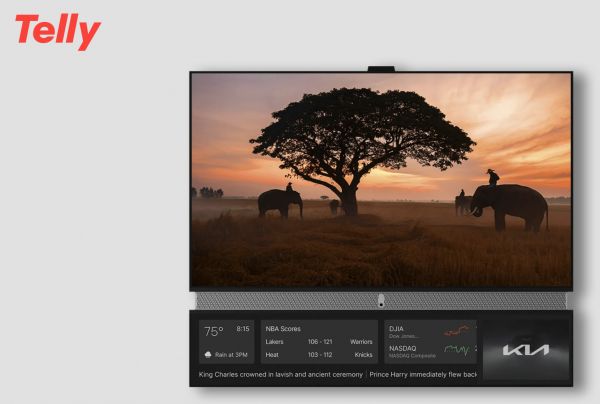Trojan Horses and Tellys

Here's the deal: A start-up company called Telly plans to give away 500,000 televisions this summer. No, these are not scrapped CRTs they scavenged from the local recycling center. These are honest-to-goodness 55-inch, 4K flat-screen TVs with three HDMI ports, webcam, voice assistant, built-in soundbar, and remote. Register, and if you are a lucky winner, they will send the TV right over to you. Plug it in. Enjoy!
Of course, there is a price to pay. Not cash money, at least not directly. But the aim, indirectly and ultimately, and is to get your cash. In particular, Telly monitors your viewing data, which is sold to companies which can then target their advertising to you. The company is very clear on this; it says it will collect data on "the audio and video content you watch, the channels you view and the duration of your viewing sessions." In addition, it will monitor "your search queries, settings preferences, applications you open, purchases or other transactions you make, buttons you select, the time, frequency and duration of your activities, the physical presence of you and any other individuals using the TV at any given time, and other usage data." Similarly, Telly asks you to complete surveys that promote targeted advertising.
To ensure that the targeted advertising successfully lands on your target-rich eyeballs, the ads are displayed right on your free TV. To accomplish this, the TVs are billed as “dual screen.” The top main screen displays the stuff you really want to watch. The secondary bottom screen displays weather, news, and sports info, video chat, and the raison d'être – the ads. In any case, you don't pay for the TV, but you might pay for the goods and services that are advertised. As they say, you can pay now, or you can pay later.
If you want a free TV, often say to yourself, “gee, I wish I had more advertising in my life,” believe that privacy is something easily waived, and have the fortitude to resist buying stuff, Telly might be a good deal. On the other hand, do you really need more exposure to advertising, and are you okay with potentially intrusive data collection? And if you lack the fortitude mentioned above, and you start buying lots of stuff that free TV might end up costing you a bundle.
Personally, I don't leave my blinds open at night, I do not enjoy showering in front of an audience, and I am generally unfashionably uncomfortable about having my data harvested and sold off for a small fee. To be fair, many tech companies scrape personal data these days. But, although sometimes arcane to do, you can opt out. You can opt out of Telly too, but they bill your credit card for the full purchase price of the TV, which kind of defeats the purpose. Also, consider that part about monitoring “the physical presence of you and any other individuals using the TV at any given time.” In other words, the TV has a motion sensor; although such sensors are becoming more common (smart thermostats, etc), it creeps me out that a TV is surveying the room – too Orwellian. So, Telly isn't for me.
The ad-supported aspect of Telly's business model is not new. There are countless good and useful things in our lives that are ad-supported. But Telly's combining of data collection and ad promotion gives it a new twist. Usually, when you buy a TV, the TV is the product. With Telly, you are the product.





























































